Group Strategy
2025-28

Group Strategy
2025-28
Over the past two years, we’ve successfully brought two organisations together, which is a significant undertaking. With no more mergers on the horizon, we’re looking forward to a period of stability ahead.
We do face increasing demands on us. Stronger regulation and rightfully higher resident expectations requires us to be more efficient and effective. We do so much great work, but residents have been clear about where we need to make improvements – we’ve heard that message clearly.
Our colleagues have shared valuable feedback and ideas for how to do this through our Better Together programme, which is focused on making things simpler, safer and smarter. We’ve begun putting these ideas into action, but we know people still need teams to work more seamlessly together and need better tools to serve residents effectively.
Whilst there’s lots we need to do, the current economic climate presents challenges. Like everyone, we’ve been managing high inflation and interest rates, amidst rising costs and wider economic uncertainty. Whilst these pressures affect us all, they disproportionately impact many Peabody residents and we remain committed to supporting people when they need it most.
Every day, we spend over £1million maintaining and improving homes. There is, however, increasing demands on our resources. New safety regulations, whilst vital, have meant implementing new safety protocols that stretch our resources further. Meanwhile, we’ve been adapting to increased scrutiny and navigating a shifting policy landscape. At times, this has created uncertainty in our operating environment. We continue to advocate for a more stable environment so we can focus on what matters most – serving our residents well.
Looking ahead
This strategy sets out our plan for the next three years and is focused squarely on improvement. Better services for residents, better together for colleagues, and better homes and places for the long-term.
We have important work planned to make these goals happen. Over the next three years, residents will see our services become more reliable – with fewer issues, quicker fixes, and clearer communication. All of this will help build trust between Peabody and the communities we serve.
Year one is about laying the foundations for longerterm improvements. Repairs remain our top priority as we continue with our new local repairs service and work to improve the entire experience. We’re creating clear service standards, so residents know what to expect from us, and we’re making our communications better across the board. We’ll also make service charge bills clearer and more transparent – something we know is especially important for homeowners.
We’re investing in better tools and training to make it easier for colleagues to do their job with ease and confidence. This includes a new management development programme, as well as a major upgrade of our equipment, technology and systems. We’ll keep supporting and empowering colleagues to make things simpler, safer and smarter.
In the coming years, we will continue to prioritise investment into our buildings to make sure they remain safe and comfortable places to live. We’ve brought together our Development and Property Services and Assets team into one new Investment Directorate. This helps us take a joined-up approach to looking after our homes – both existing ones and those we’re building. This year, we’ll create the Peabody 200: asset investment strategy. This will be an important long-term plan that ensures our investment decisions are well-balanced and focused on the continuous improvement of our homes, buildings, and other communal spaces between now and our 200th anniversary in 2062.
To achieve all our aims, we need to think big while acting locally. We’ll be working to integrate a local approach into every aspect of Peabody – making it a fundamental principle that guides our planning and operations. We’ll be testing innovative ways to do this through local place-pilots that will help discover new ways of working effectively at a local level.
This document outlines our purpose, mission, vision for local working, and our key priorities for the next three years. Driven by our charitable purpose and building on over 160 years of service, we’re confident that by working together, we can continue to deliver on our mission for generations to come.
We know the path ahead will require careful decisions and persistent effort, but we’re committed to making meaningful improvements that residents will benefit from over the course of this strategy.
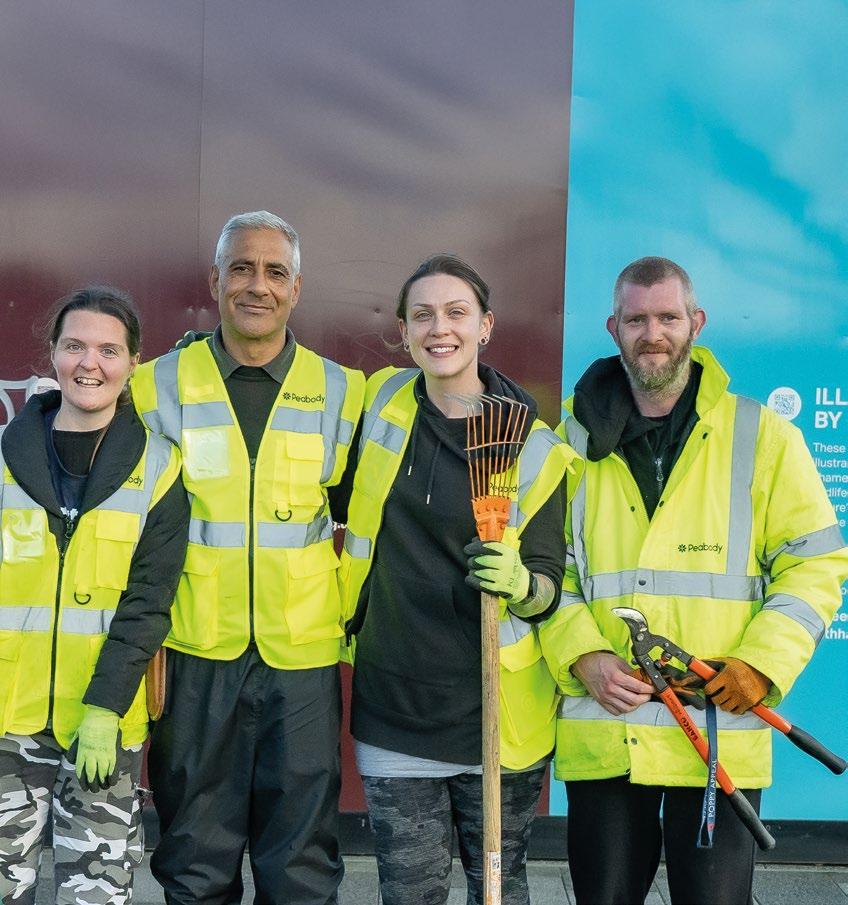
“ We’re here to provide quality homes, work with communities to strengthen neighbourhoods, and support people when they need it most.”
Few things are more important to someone than their home. It’s their refuge, the foundation for health and happiness.
Founded in 1862 by George Peabody to help Londoners in need, we’ve been providing safe, secure and comfortable homes for over 160 years.
We draw our inspiration from the thousands of families who’ve built their lives in our communities over the years. That’s why we’re committed to providing quality homes that don’t just serve people well today, but will stand strong for many generations to come.
We’re here to provide quality homes, work with communities to strengthen neighbourhoods, and support people when they need it most.
We look after 108,000 homes across London and the home counties, plus the community centres, play areas, and green spaces that bring these areas to life. Our job is to keep these places well-maintained and provide reliable landlord services.
We serve more than 220,000 people who live in these homes. They’re a mix of renters and homeowners, with another 26,000 people who receive our care services. We believe in building strong, trusting and respectful relationships with everyone in the Peabody community. That’s why we value the feedback and experiences residents share with us, using that to directly influence how we work.
Every day committed residents are creating positive changes in their neighbourhoods. We’re proud to work side by side with tenant groups and local organisations to help create stronger communities together.
When life gets challenging – whether it’s keeping up with bills, managing debt, or finding work – we’re here to help find solutions. Often, we connect with other services to make sure people get the right support when they need it most.
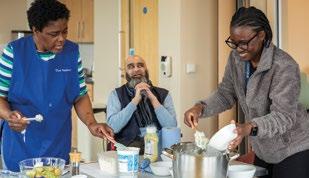
Our Community Foundation sits at the heart of our social purpose. We’re focused on making a real difference in our communities with a clear vision: helping residents become healthier, wealthier and happier. Our programmes and projects bring people together to co-create solutions that respond to some of society’s toughest challenges – from child poverty to homelessness; underemployment to violence affecting young people. We’ll continue delivering programmes that channel our investment, skills and resources directly into our communities where they are needed most.
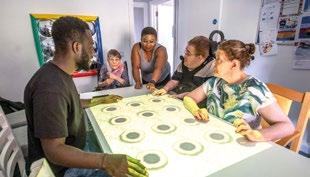
Beyond our role as a landlord, we provide specialist homes and care and support services that help over 26,000 vulnerable people live their best lives. Through carefully designed homes and personalised support, we help people achieve independence, stability, wellbeing and happiness in their everyday lives.
Local Peabody is a mindset to guide how we work across the organisation. It’s the tool we need to really deliver on our mission.
When Catalyst and Peabody joined together, we made a commitment to get closer to residents through taking a local approach. We’ve already made significant strides towards this with our regional structure, smaller neighbourhood patches and localised repairs service. These changes have improved teamwork and strengthened relationships.
We remain committed to this way of working. Being local means more than being based nearby – it’s about creating relationships and connections that help us better serve the communities we work in.
The vision we’re working towards is where:
• We run things locally: Decisions are tailored to each area, based on a deep understanding of that place and its unique needs.
• Accessible staff: Residents can easily find approachable, knowledgeable staff nearby to where they live. There are dedicated local teams who know each neighbourhood well.
• Teams work as one: Our teams pull together with shared goals, clear responsibilities, and a collaborative spirit that puts the neighbourhood first.
• Community partnership: We work with residents to improve the neighbourhood, investing wisely to make the biggest difference to the people who live there.
• Proactive management: Being closely connected to the neighbourhood means we can better prevent issues before they arise and respond quickly when issues do come up.
Every neighbourhood has its own distinct personality. Yet all places work better when each elementhomes, buildings, public spaces, services, community and culture - works in harmony. A place-based approach goes beyond simply managing properties. It’s about making the most of these connections.
In many places, we’re responsible for parts of the environment beyond the housing. To be genuinely local, we need to consider the whole place and develop a complete picture of each community. This allows us to move away from a one-size-fits-all approach and recognises that every place has different strengths and needs.
Under this approach, we need to work beyond departmental and even organisational boundaries. With limited resources, we need to work collectively with other stakeholders and think creatively about how we make the most impact. Collaborating with residents and partners to develop new solutions for their neighbourhoods is essential.
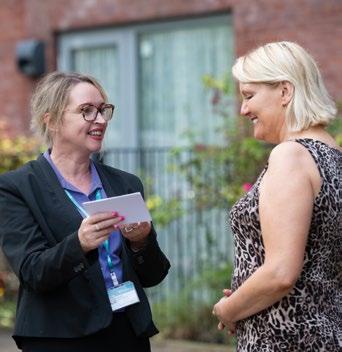
Sustainable, healthy places
Comfortable homes
Well-kept buildings
Safe and welcoming public spaces
Easy
Strong community
Vibrant culture
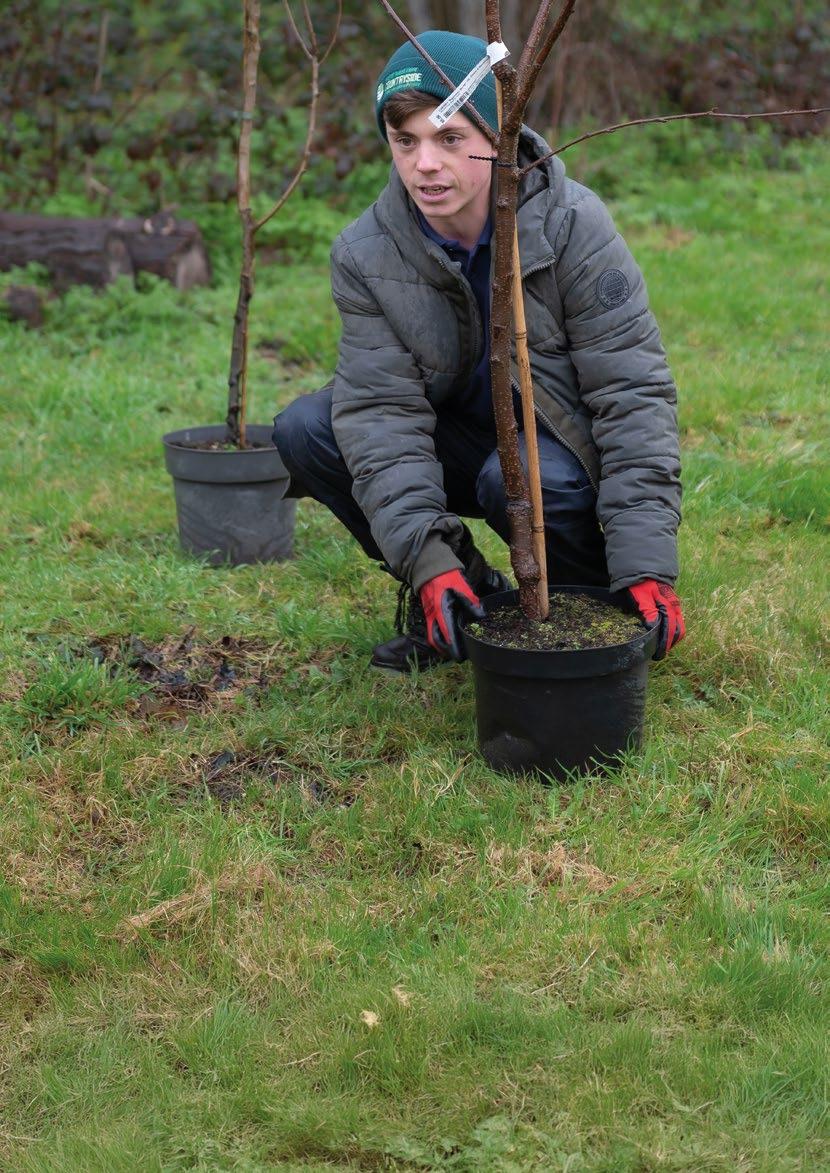
While fully achieving this vision may extend beyond this strategy’s timeframe, we’re starting right away.
This vision and approach will shape all our improvement work over the next three years. This year, we’ll also launch a new pilot programme to research and develop different ways of working local. This will serve as a testing ground for operational improvements and help us explore how we can purposefully design our services to be more responsive to local needs.
Our work in Thamesmead, where we own two-thirds of the town, including more than 5,600 homes, is a blueprint for our whole place approach. We’ve been working with communities and partners since we launched our Plan for Thamesmead in 2018 to improve, grow and look after the town for the longterm. We split our work into five themes: town management, inclusive growth and regeneration, improving the landscape, making space for culture, and supporting communities to thrive.
We’re now looking at how we can apply the same principles to help us strengthen and create sustainable neighbourhoods and places elsewhere.
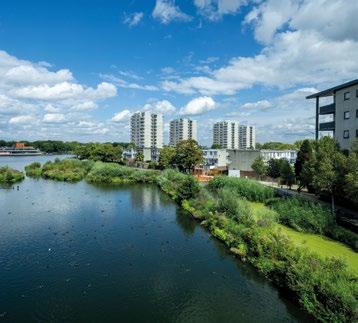
1. 2. 3.
Over the next three years, we’ll prioritise the following areas of work:
Better services for residents.
Better together for colleagues.
Better homes and places for the long-term.
All of this is underpinned by our continued focus on financial resilience in everything we do.

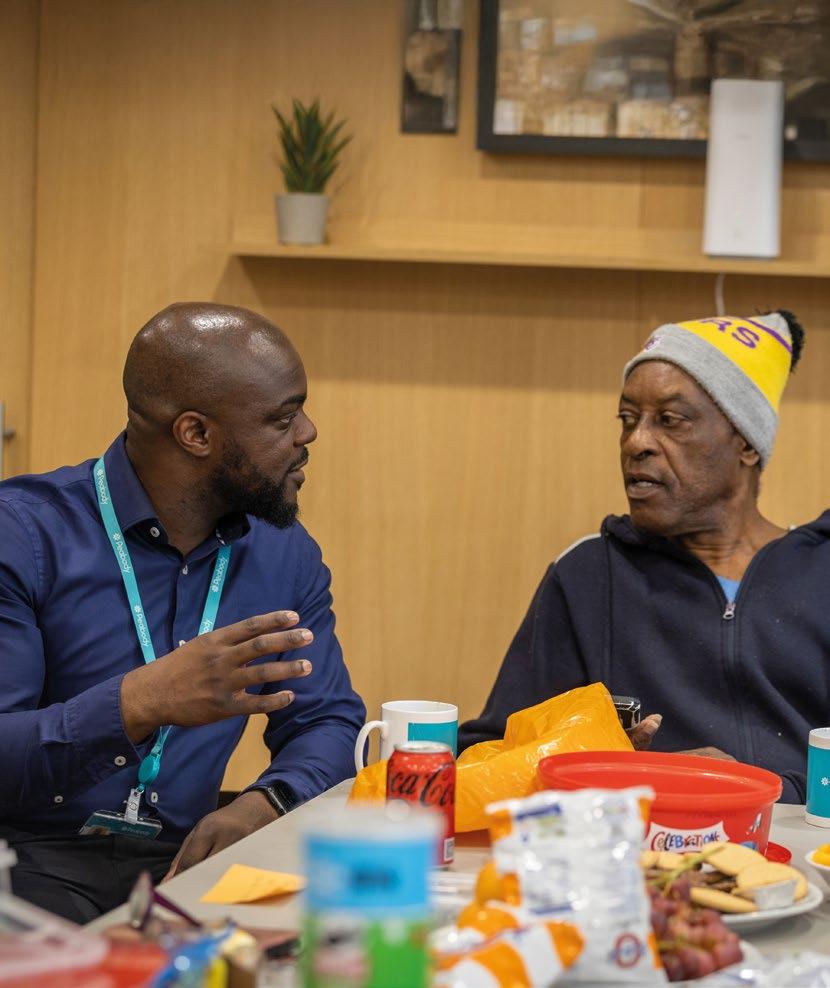
We’re committed to improving our services to create simpler, better experiences for residents. Our local approach will help, by enabling teams to be more responsive and collaborative where it matters most.
Whilst acting with urgency, we’ll carefully balance speed with quality design and implementation of the changes needed to make that happen. We’ll make sure we understand the root causes of why our services sometimes fall short of expectations, listening carefully to the feedback and experiences of residents and using that to purposefully design service improvements.
The result will be improved service quality and response times for residents and more efficient ways of working for our teams.
To deliver Better Services, we’ve set five shared objectives:
1. Minimise service failures. Remove the demand created by failures or mistakes that can be avoided. Wherever possible, fix residents’ issues on the first attempt. Guarantee prompt completion of remaining issues within established timeframes.
2. Establish clear and accessible service standards. Be more reliable through setting clear expectations on quality and timelines.
3. Communicate better. Be clear, friendly and consistent. Actively listen to feedback and respond promptly.
4. Deepen our understanding of residents’ needs. Gather and analyse information on needs and preferences. Use this to tailor and improve services.
5. Pilot new ways of working and design user friendly services. Co-create innovative solutions with residents and colleagues.
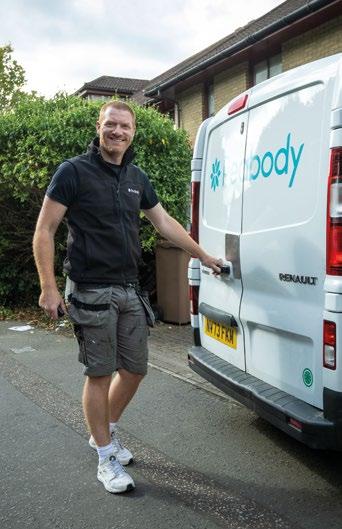
We’re focused on improving the resident experience by fixing things quickly, solving problems faster, and making every interaction with us a positive one that builds trust. There will be many detailed metrics we’ll be tracking to measure these improvements, but the four headline measures we aim to see improving are:
Improved satisfaction: While we recognise that changing perceptions takes time, our aim is that these improvements will contribute to a significant rise in overall satisfaction for renters and homeowners. We’re targeting a 7% increase.
Better repairs: We’ll complete repair requests promptly and efficiently, with a 19% increase in repairs completed in target and a 5% rise in satisfaction scores.
Better communication: We’ll keep residents better informed and use the feedback we get actively. We’re targeting a 10% improvement in feedback scores about our responsiveness and whether we listen to residents’ views and act upon them.
Fewer complaints: As trust builds and service quality improves, we expect to see a 10% reduction in the number of complaints.
We have work to do. Our Tenant Satisfaction Measures are not where we want them to be and the c.50% increase in complaints over the last year shows us specific areas where we need to improve:
Repairs need attention - we need to keep appointments more reliably and follow up properly after the work is completed.
Neighbourhood issues matter - residents are concerned about antisocial behaviour and the general upkeep of their neighbourhoods.
Transparency on service charges - questions about rent and service charges are increasing, with homeowners raising more concerns about leases and managing agents. We need to challenge costs from our contractors to ensure costs passed on to residents in their service charge represent value for money.
Communication needs improvement - residents tell us that reporting problems can be frustrating with long wait times and inconsistent updates. Residents want to know more about their local contacts and when they’ll be around in the area.
Giving feedback should be easier - it needs to be simpler for residents to share their thoughts and make complaints where needed.
We’ve made some positive steps, but it’s clear we’re not meeting expectations. Making meaningful improvements to how we work is essential for providing better services.

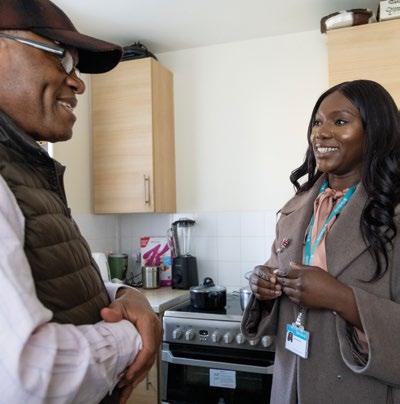
In year one, we will lay the foundations for long-term improvements across our services, whilst making sure there’s visible progress from the start. Alongside continuously improving our day-to-day work, we’re prioritising the following initiatives:
• Repairs service: We’re strengthening our local Repairs Service, with additional staff to support the introduction of Awaab’s Law and boost overall capacity. We’ll improve contractor relationships, making sure we’re recovering costs for service failures, and launch a ‘repair resident journey’ programme to understand and enhance the resident experience from start to finish. These improvements aim to reduce the cost of failure and reduce complaints, meaning we can reinvest savings back in our services.
• Service standards: We’ll co-design clear, measurable Service Standards with residents and colleagues. This will cover key services, like repairs and estates services, alongside internal support services and communications. These will be publicly available, which means we can track performance with residents and use this to drive continuous improvements.
• Homeowner services: We’re launching a dedicated improvement programme, which will start with a review and refinement of management fee calculations, the processes around fixed service charges, and billing for commercial leases. We’ll also undertake a careful assessment of sinking funds, continue our proactive management of major works billing, and evaluate our management systems so we can better serve homeowners.
• Communications: Our Better Communication project aims to make sure we provide residents with information that’s clear, consistent and easy to understand. Early discovery work has helped us understand what residents currently experience and explore the ways we can improve our processes to make it easier for colleagues to provide this. We’ll use this insight to create a targeted improvement programme.
• Complaints management: We’ll continue to improve how we manage complaints, using insights from the Housing Ombudsman to improve resident experience. A new triage system will mean residents get help faster and fewer issues need to be escalated.
Complaints data will help identify service failures and will be used to drive improvements.
• Resident engagement: We’re strengthening residents’ voices across all levels of our organisation to drive meaningful change. We’ll continue to support a diverse range of ways to involve residents in our work. This includes resident Board roles and strategic panels like the Resident Led Panel, to supporting local Tenant and Resident Associations and Regional Forums, alongside specific focus groups, surveys and consultations. We’ll be transparent and open, valuing the scrutiny this provides and welcoming new ideas to ensure residents’ perspectives influence decisions.
• Care and support: We’ll strengthen our care and support services through strength-based and trauma informed approaches, improving our ways of working to help achieve this and delivering engagement activities that increase customer influence.
• Local, place-based innovation: We’ll continue to embed and learn from successful local programmes, such as our place-based community investment model and the co-production culture model in Thamesmead. We’ll also deepen local impact by rolling out neighbourhood plans and continue to provide local community services, such as safe and inclusive community centres and our economic inclusion offer. We’ll launch a new place-based pilot, using all this learning to create a roadmap for the next phase on this path.



Success depends on the dedication and hard work of our 4,000 colleagues. We’re committed to making it easier and more enjoyable for everyone to do their job with confidence.
To build this high-performance culture, we’ll make sure we give our teams the tools they need to excel. We’ll continue empowering colleagues to make our ways of working simpler, safer and smarter – because when our colleagues can do their best work, residents get a better service.
To achieve our Better Together aims, we’ve set ourselves seven objectives. We will:
1. Improve data collection and management. Invest in data quality and embed strong data governance practices.
2. Modernise business tools and systems. Provide new equipment and upgrade to new cloud technology.
3. Support colleague development and skills training. Foster a high-performance culture that supports personal growth and gives people confidence to excel, providing skills training through the Peabody Academy.
4. Strengthen our ‘Better Together’ approach. Continue to make things simpler, safer and smarter,
5. Streamline processes and procedures. Improve efficiency and make it easier to get things done.
6. Deliver our strategic Equality Diversity and Inclusion objectives. Continue to implement our current strategy.
7. Ensure robust governance. Make sure we meet all regulatory requirements.
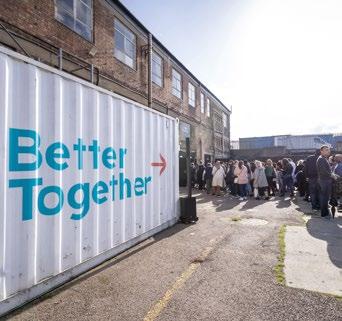
Over the course of this strategy, we’ll create an environment where our colleagues are supported and able to do their best work. There will be many detailed metrics we’ll be tracking to measure our progress, but the headline measures we aim to see improving are:
Engaged teams: We’re aiming for a 12% increase in colleague engagement, building a place where people feel valued and empowered to do their work.
Skilled leadership: All managers will complete our Better Together programme and will use our new Performance Management framework to help their teams deliver. Our Academy will expand, helping develop skills and talent across the organisation.
Better tools and technology: We’ll upgrade the systems colleagues use every day by moving our core systems to the cloud. This means less time on manual tasks, easier ways to keep records and communicate, and an overall boost to productivity. This will be reflected in a 12% increase to colleagues’ feedback that they have the tools and technology they need to do a good job.
Working better together: We’ll make it easier for teams to suggest and implement better ways of working within and across teams, especially when it comes to serving local needs.
Better data: We’ll continue to improve our data quality, ensuring teams have the information they need about our homes, neighbourhoods and residents.
A place where everyone belongs: We’ll meet our equality, diversity and inclusion goals, making sure Peabody is a place where everyone feels welcome and valued.
The past few years have been a time of significant change as we completed our integration process. What was accomplished during this time was remarkable, but we recognise this journey hasn’t been easy for everyone and many people took heavier workloads and faced uncertainty along the way.
We were heartened to see a rise in colleague engagement in 2024. More people told us they felt their voice is heard and they see a long-term future for their career at Peabody.
This positive shift owes much to the conversations and actions sparked by the Better Together programme. The honest feedback through this work has directly shaped this strategy and our priorities for the next few years.
While we’ve made some positive steps, we know there are concerns around workloads and a need for better tools and technology, including more reliable data –addressing these needs is a central focus of this strategy.
Our value of ‘celebrating diversity’ continues to guide our work towards a fairer and more inclusive workplace. We’ve made progress in narrowing our gender and ethnicity pay gaps and building leadership teams that better reflect the diverse communities we work with, but have not yet met our targets for a more diverse Board and Leadership team. Diversity, equality and inclusion remains a core priority as we move forward together and although we know there’s still much more to accomplish, our brilliant colleague-led diversity networks are leading the way.


In our first year, we’ll build on our progress and maintain the Better Together programme’s focus on making things simple, safe and smart. Our key initiatives are:
• Data management: We’re continuing to improve how we collect and use data across the organisation. We’ll equip colleagues with the right tools and skills to effectively manage data, making sure we use each touchpoint to improve the quality of the data we hold. Better resident and property data will support all our improvements, including how we work and make decisions at a local level.
• Tools and technology upgrade: Colleagues will get new equipment, including phones and laptops, and we’ll be improving the network connection in our offices. We’re also investing significantly in upgrading our systems. We’ll commence moving our building safety and compliance information into our core NEC system, start the development of a new cloud-based CRM system, transition key applications to cloud technology, and replace the existing Citrix platform. We’ll also research how we can improve other everyday systems used by teams including finance, sales and development, people operations, care, and support. These upgrades will be a catalyst to create simpler, more efficient ways of working together to serve residents.
• Professional development: Every manager will benefit from our Better Together People Management programme and we will develop clear pathways for aspiring managers. Our new Performance Management framework will connect individual contributions to our new strategic priorities. All teams will be supported to create a local People Plan. Through our Academy and apprenticeship programmes, we’ll build skills to deliver this strategy and help tackle the skills shortages in the sector. In specialised areas we will continue to deliver technical training to make sure all our teams have the expertise they need.
• Reward and recognition: We will conduct a long-term review of our pay and grading approach to ensure consistency in pay setting, support attraction, progression, and retention, promote internal pay equality, control costs, and positively impact pay gaps.
• Better ways of working: Teams across the organisation are finding ways to work better together and make things simpler, safer and smarter. From streamlining financial reporting, improved sales processes on new homes, to enhanced new home design standards, teams are using this initiative to find better ways to get things done. We’re focused on breaking down silos and improving cross-team collaboration in support of our Local Peabody vision.
• Safety and governance: Safety continues to be a priority and we are committed to the highest health and safety standards. We’ll continue to make sure we have strong and robust governance in place, with a focus on meeting the new consumer standards and all other regulatory requirements – ensuring we protect colleagues, communities and Peabody.
• Inclusive workplace: Our diversity networks will lead our inclusion work, with special attention on reviewing recruitment processes and continuing to close gender and ethnicity pay gaps.

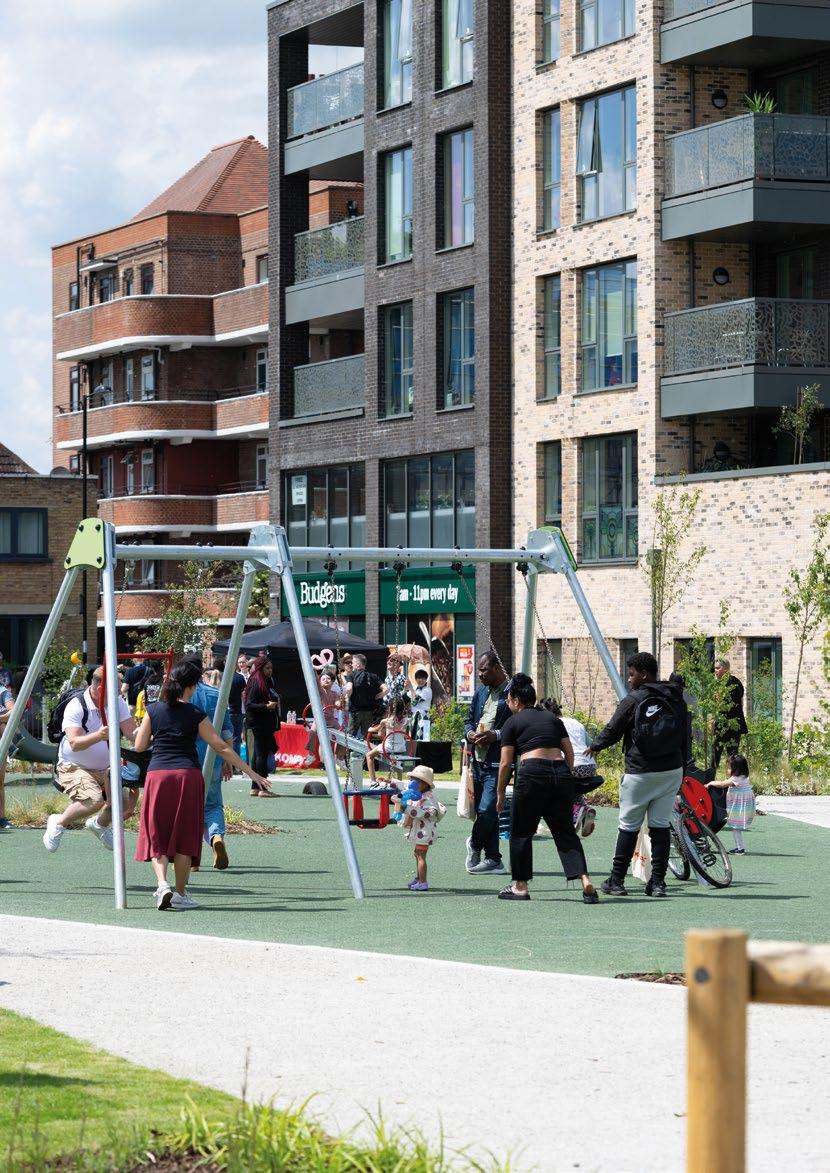
The decisions we make today have an impact for years to come. We’re making strategic investments to ensure the long-term safety, sustainability and resilience of our homes, places and communities.
‘Peabody 200’ will create a clear framework to make sure our investment decisions are balanced and carefully prioritised so we can ensure the continual improvement of our homes, buildings and shared spaces between now and our 200th anniversary, 2062.
We’ll create a new tool, local portfolio plans, so that investment decisions reflect local needs and will look to simplify things where we have complex management arrangements.
We’ll continue to deliver our pipeline of new homes, with an aim to create new pathways to build additional homes beyond our current commitments through partnerships and alternative funding streams.
To achieve Better Homes and Places, we’ve set seven objectives:
1. Prioritise investments on existing buildings and enhance resident safety, comfort and health. Tackle issues as they arise and make improvements to maintain standards.
2. Deliver our committed programme of new homes. Explore how we create additional capacity to increase our pipeline for future years.
3. Create a culture of stewardship and care for our homes and assets across the organisation. Empower all colleagues to take responsibility for the care and maintenance of the assets we own and manage.
4. Improve how we make investment decisions. More use of whole life costing and other measures such as whole life carbon costing.
5. Maintain complete records for all our homes, buildings and public spaces. Ensure timely and accurate updates to records when changes or improvements are made.
6. Refurbish and relet empty homes quickly. Maximise the benefits and value from each property.
7. Plan how we mitigate the risks and impacts of climate change, while enhancing climate resilience. Reduce our environmental footprint.
Throughout this strategy, we’re focused on improving the quality and upkeep of residents’ homes and neighbourhoods. We’ll be tracking a range of metrics to measure our progress, but the key outcomes we’re aiming for are:
Well maintained homes: We’re aiming to increase resident satisfaction with home maintenance by 5%.
Safe and compliant: We’ll maintain 100% decent homes and ensure all compliance checks are in place. We’ll continue to deliver core building safety works, targeting a 10% rise in residents satisfied that their home is safe.
Enhanced neighbourhoods: Reflecting our focus on local, place-based working, we aim to increase resident satisfaction with our contribution to their neighbourhoods by 10%.
New home delivery: We’ll deliver our current committed programme of new homes and actively seek to bring forward additional new homes through partnerships and alternative funding options.
Long-term stewardship: We’ll launch the ‘Peabody 200: Asset Investment strategy’ and use this to foster an organisation wide culture of care for our assets.
Sustainability and decarbonisation: Our pathway to achieving net-zero emissions by 2050, and our strategy around sustainability and climate risk mitigation, will be clearly set out within the new Peabody 200 strategy.
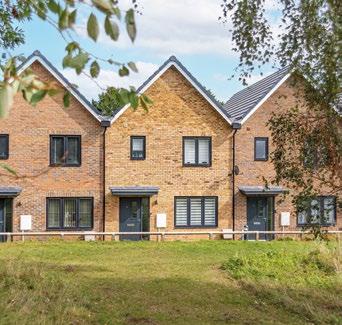
Over the past few years, we’ve made substantial investment to make sure our homes remain safe, secure and fit for the future. That includes focusing on our environmental impact, through improving the energy efficiency of our homes, increasing the diversity of our landscapes, and shrinking our carbon footprint.
We’re continuing to deliver new homes where we can, prioritising building in local areas where we already own and managing homes to make sure we add long-term value to all communities. Our commercial properties have demonstrated a strong return, reflecting a healthy performance in the current market.
However, this period has presented considerable challenges. The implementation of new regulations, such as the Building Safety Acts, has placed increased demands on our resources, particularly in relation to the new safety protocols we’ve put in place. We anticipate these demands will continue to grow, especially with the introduction of Awaab’s law, which will likely increase the need for temporary accommodation during these essential works.
These pressures mean we must make careful decisions. We will continue to make sure all essential building safety works and compliance activities are covered as a priority. We remain fully committed to delivering our existing development pipeline, which is substantial, however we have made the strategic decision to carefully pause projects not yet contractually committed whilst we look for alternative ways to deliver them – either through partnerships or alternative funding options.
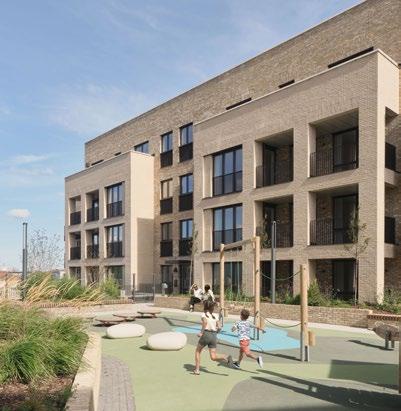
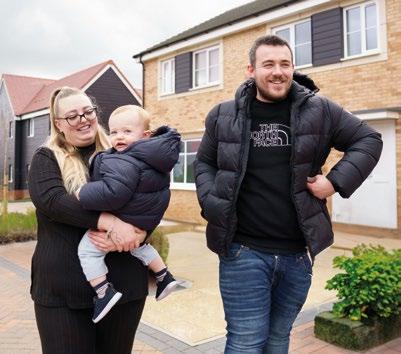
In year one, we will lay the foundations for our long-term plans, whilst continuing to deliver our existing investment programmes. This includes the following initiatives:
• Essential maintenance and safety: We will prioritise the delivery of all the necessary health and safety compliance and building safety remediation. We know there’s high demand for investment into our properties, so we’ve had to make careful choices. We’ve focused planned maintenance programmes on critical fire risks and building safety remediation, tackling damp, mould and condensation issues, alongside external decorations, kitchen and window replacements. We will continue our energy efficiency improvements through the Social Housing Decarbonisation Fund wave 2, and subject to final agreements, Town and Country Homes will progress with wave 3 this year.
• Peabody 200 strategy: We’re bringing together our Development and Property Services and Assets teams to form a new Investment Directorate. This will help us manage the entire lifecycle of all our assets in a more integrated way, from initial design to operations and maintenance. A dedicated Peabody 200 Delivery Board and strategic working group has been established to lead a new Peabody 200 Asset Investment strategy. This will involve creating new tools, including Local Portfolio Plans, to enable place-based decision making. Peabody 200 will bring together important workstreams including a review of our design standards and approach for new homes and places, a review of options to accelerate delivery on our uncommitted development pipeline, and our approach on climate resilience, to make sure these contribute to a cohesive, long-term asset investment plan.
• Strengthening building compliance: We’re launching a new multi-year building safety and compliance improvement programme. Over the course of the programme we’ll focus on safety information for our buildings, including service schedules and ownership data, and the documentation of safety and compliance components. We’ll improve processes and digitise documentation, making it easier for colleagues to access information and empower residents with greater awareness of why we carry out activities and an ability to self- manage appointments. We’ll also be enhancing proactive risk management through our risk profiles, robust audits and performance reporting.
• External managing agents project: We will launch a new project to improve how we work with external managing agents. This will look at roles and responsibilities, improving relationship management, refining data management and collection processes.
• Sustainability: We’re establishing a new climate resilience group under the Peabody 200 banner to assess and mitigate climate risks across the portfolio. We’ll support each Directorate to create data-backed Carbon Plans, with training and awareness campaigns to drive team-level carbon reduction. We’re committed to engaging residents, building on our successful pilot programmes. Our new homes will aim high energy efficiency standards and will transition away from gas heating, and we’ll continue to retrofit existing homes. All of this will inform a comprehensive sustainability strategy covering climate risk and decarbonisation.
• Local, place-based innovation: Our focus on Place will continue, including the creation of a new Sustainable Places panel, which will bring together external experts to help develop our thinking on place management, stewardship and sustainability. The panel will support existing place-based initiatives, including delivery of our Plan for Thamesmead. We will develop a new group-wide Landscape strategy and deliver improvements to communal areas, including planting, play spaces, and public realm refurbishments. All of this will be in support of Local Peabody, embedding place-based working practices and exploring opportunities to embed all aspects of place, such as culture and community development, into the model.


As a long-term business, Peabody is committed to ensuring we have robust financial and organisational resilience. This means we can withstand financial shocks and adapt to changing environments.
Over the next three years, we will strengthen our foundations through strategic financial planning and the prudent management of our resources, with a strong focus on value for money, which is woven through all activities being delivered in this strategy.
To achieve this, we’ve set five financial objectives:
1. Stretching, yet achievable budgets. We’ll create budgets that are ambitious, but realistic, and invest wisely in improvements that help us work more efficiently and productively.
2. Responsible borrowing. We’ll keep our debt levels manageable.
3. Create capacity to deliver additional new homes. We’ll look for new ways to build homes that limits the strain on our finances.
4. Make the most of our assets. Ensure all properties and assets provide a sustainable return, develop plans for those that aren’t performing well.
5. Maintain financial security. Keep a healthy level of cash reserves, which will protect against economic turbulence.
The last few years have proven to be particularly financially challenging. Like everyone, we’ve been working in a high-inflation, high-interest rate environment. Energy price volatility has added pressure, as have other rising costs. We have had to make careful choices about where to prioritise investment. Despite this, our current financial performance shows the Group’s financial resilience and continued commitment to investing in our assets during a difficult economic climate.
Our financial strength drives our mission. Given these pressures, it is vitally important we get the best value and outcomes from everything we do, making sure every pound spent serves our communities effectively and achieves the best balance across economy, efficiency, effectiveness, equity and environment –our five value for money principles.
Alongside all the improvements we will make as part of this strategy, we will pay particular attention to:
• Smart financial management: We’ll deliver on our stretching, but achievable budget targets. That includes full recovery of eligible costs and maintaining fair, reasonable and transparent service charges.
• Operational excellence: We’re boosting productivity and eliminating process inefficiencies to reduce costs across the organisation. That will include a focus on a faster turnaround of empty properties to be relet, resolving complaints and progressing disrepair cases in a timely fashion, and cutting failure demand through operational improvements and efficiencies.
• Investment programmes: We’re committed to meeting our sales target for new build properties, whilst carefully monitoring London’s property market conditions and making decisions on additional capacity to bring forward further sites this year. We’ll continue to generate a healthy surplus from our commercial property portfolio.
Thank you to the many residents and colleagues who contributed to this strategy and whose insights, experiences and ideas have shaped our plans. The ideas shared through focus groups, surveys and conversations, have directly informed our priorities and approach. We especially acknowledge the contribution of residents who are already actively involved in improving our services, whose honest feedback has been invaluable in building a more responsive and effective organisation.
This document marks the beginning rather than the end of our strategic planning. Here’s how we’ll keep evolving:
• We’ll prepare a more in-depth plan for 2025-26, setting out the detailed KPI information and milestones we’ll deliver this year to support the strategy.
• We’ll create regular performance updates which will be reviewed by the Peabody Board and Leadership teams, tracking progress against each of our three priority areas.
• We’ll work with the Resident Led Panel to conduct reviews of key initiatives as well as the overall delivery of the strategy.
• We’ll do an annual strategy refresh to formally update our plans, based on emerging information, resident feedback, and changing external conditions.
By maintaining this regular dialogue and being willing to adapt, we’ll make sure this strategy remains relevant and responsive throughout the next three years it runs.
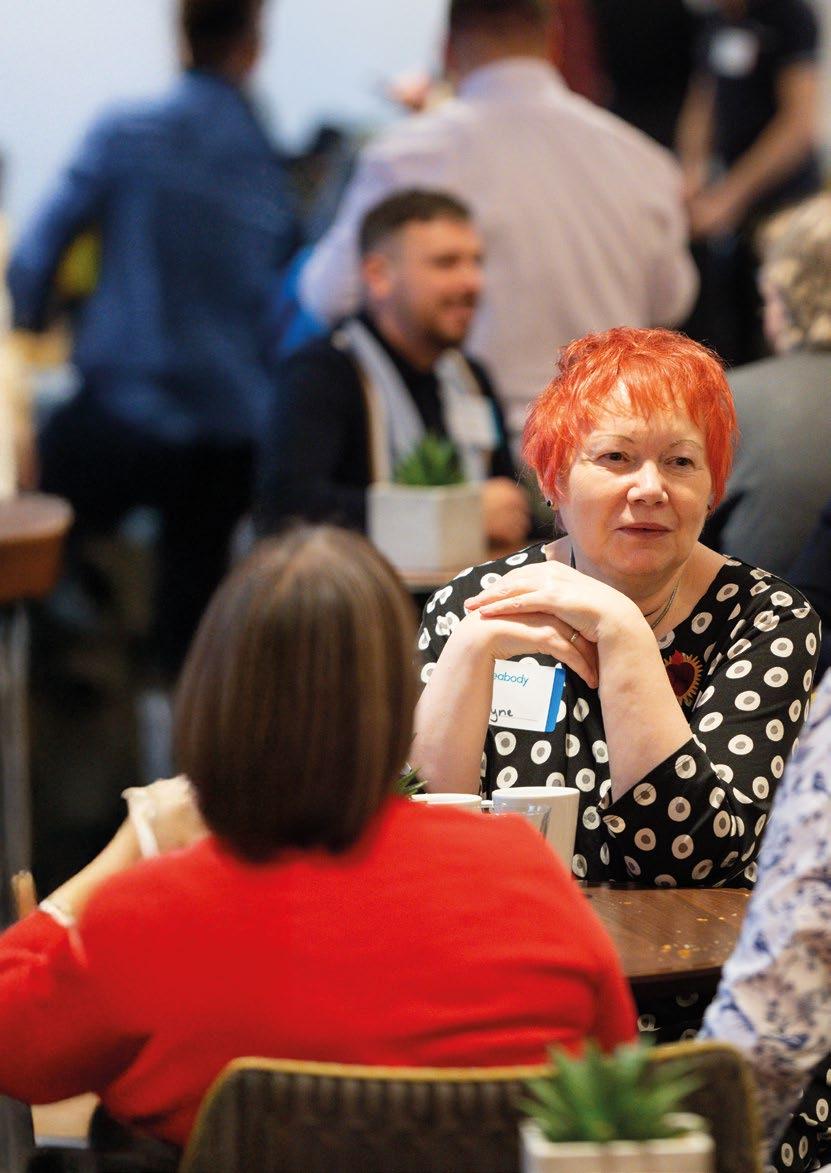

We’re committed to embedding a culture where resident voices matter across everything we do at Peabody. By listening closely to residents and working together as equal partners, we can make positive changes that really make a difference. We value all residents who help us get better at what we do – including our strategic panels who help shape our services, local Tenant and Resident Associations, or those who share their thoughts from focus groups, surveys and consultations.

Underneath this strategy, there are lots of enabling strategies, plans and policies which we will continue to deliver. Some key links include:
A statement of our values: www.peabodygroup.org.uk/about-us/ our-values-and-purpose/
Equality, Diversity and Inclusion strategy: www.peabody.org.uk/media/4zxdkuh4/peabody-edistrategy-23-2.pdf
Community Investment strategy: www.peabodygroup.org.uk/media/2b1c5ejt/peabodycommunity-investment-strategy.pdf
Information on our Care and Support services: www.peabody.org.uk/supporting-you/ care-and-support/
Environmental Sustainability strategy: www.peabodygroup.org.uk/media/3v4p0yhh/ peabody-sustainability-strategy-23-26.pdf
General information on how Peabody is run: www.peabodygroup.org.uk/about-us/who-we-are/
Town and Country Housing: TCH is a subsidiary within the Peabody Group, which manages more than 13,000 homes across Kent, Surrey and Sussex. Our strategies align with a shared purpose, mission and strategic priorities. The TCH corporate strategy is to be finalised in May.
Tel: 0300 123 3456
peabody.org.uk